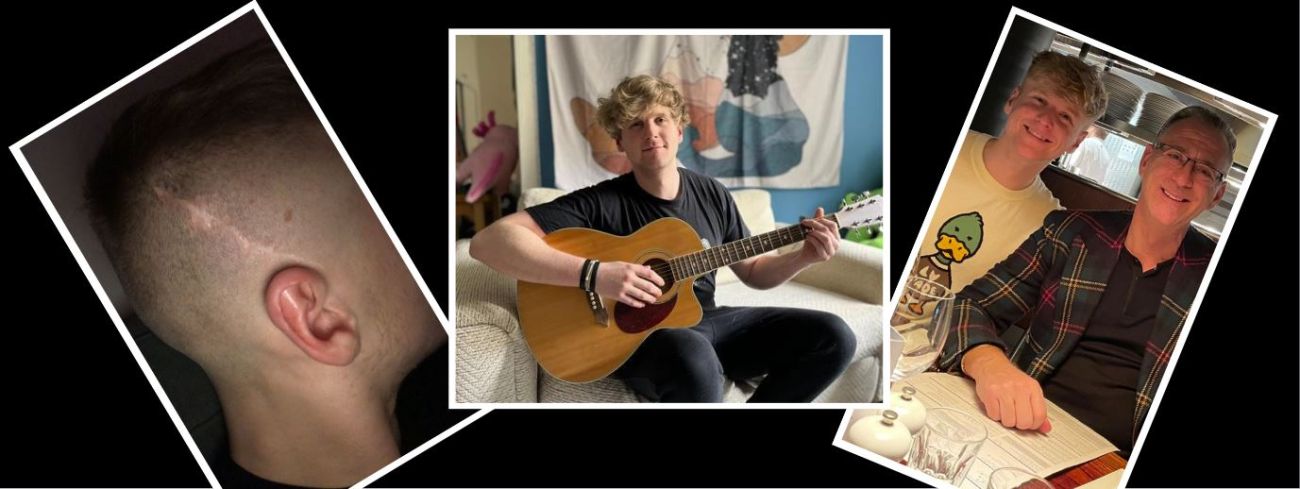Brain injury survivor hopes to end stigma with music career dream

Harry Davies was just 11-years-old when he was hit by a van as he cycled home from school.
He suffered a serious brain injury that left him in a coma for two weeks but after defying the odds he recovered to lead an independent life and has his eyes set on a future as a musician.
Harry, now aged 21, hopes that by sharing his journey at the Head Injury Information Day in Edinburgh he can help end the stigma around brain injuries.
He said: “Life is already delicate so there’s no point in wasting time being scared of the life you have when you could be enjoying it instead.”
Harry was cycling home in 2013 from Pencaitland Primary School on the B6363 near Haddington, East Lothian when he was a hit by a delivery van.
When paramedics arrived they found him to be unresponsive – he was then raced to the Royal Hospital for Sick Kids in Edinburgh.
Harry underwent emergency surgery to tackle a bleed on the brain – surgeons also fitted a special bolt designed to relieve the pressure inside his skull.
It’s thought his cycling helmet was the only reason he survived.
He was then placed in a coma and woke up two weeks later on Father’s Day.
Harry’s dad, Nick, recalled the moment he first saw his son in hospital, saying: “It’s only in the past couple of years I’ve been able to talk about this without crying.
“When I first saw Harry he was wired up to machines and monitors… it was just shocking.”
Harry, who now lives in Edinburgh and works as a barista, added: “I didn’t really understand the severity of everything until a few months after I woke from the coma when the specialists told me there was a real chance I could have died.
“The odds were something like a 75% chance of dying – talking about that now feels weird when I think about how well my recovery has been.”
At the time, Harry’s physical recovery was described by rehab staff as “remarkable” but he noticed that during his teenage years he was treated differently.
School staff insisted a minder walk with him in corridors and he was not allowed to participate in sports or PE on the advice of medical staff.
However this wasn’t a major issue because Harry’s passion was always music.
He said: “I play guitar and drums and I’ve always loved that but it’s in music production where I hope to progress and something I’d very much like to get serious about.
“It provides a great creative outlet for me, a bit therapeutic as well, but it’s definitely more than a hobby and I’m already creating music and hope to build more projects there.”
Nowadays Harry feels his life is only impacted in two ways – he sometimes forgets what he needs when going to the supermarket and TV subtitles help him concentrate while watching a show.
Harry explained: “My friends, school and people outside my family were very delicate with me for a long time during my teenage years.
“I had to tell them ‘Look, I’m fine – you don’t need to hover around me like I’m made of glass.’
“Some people thought I was more outgoing as a child before the accident and then after I was more withdrawn – but it’s impossible to say if that was because of the crash or because it was normal teenage angst.”
Harry’s dad, Nick, added: “There were times we did wonder if the Harry we have now is the Harry he was always meant to be even without the crash?
“The way Harry recovered has been incredible and we are under no illusion with the luck we have – he was wearing a helmet at the time of the crash so when we think about how much that helped as well it should offer an important reminder.
“Even the crash – Harry was hit on a rural road yet received immediate help from an off-duty firefighter who happened to be passing and it turned out that firefighter just had head injury refresher training the week before.”
Harry and Nick are set to give an inspirational talk at our 2023 Head Injury Information Day in Edinburgh next week – an event that brings together the brain injury community to network, share ideas and access support.
He said: “Each survivor is unique and each has their own story so it’s okay to ask survivors if they need help but ask them what THEY need, respect their answer and let them live their life.”
Nick added: “The most important thing we can all do for brain injury survivors is to not impose restrictions on them.
“If you teach people how to be their own person, how to graft and how to not be a victim then everyone has the capacity to crack on and thrive.”
Visit the Head Injury Information Day page to learn how we help survivors of acquired brain injuries.
Harry’s story was reported in the media including STV and the East Lothian Courier.